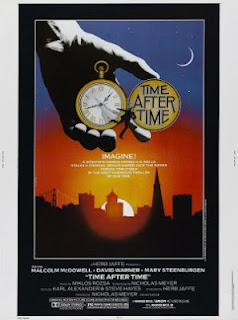Time After Time
After reading H.G. Wells' The Time Machine last week, I was interested to see a movie about it. I've seen both of the adaptations of the movie--one in 1960, one in 2002, and have no burning desire to see them again, but I hadn't seen the 1979 Nicholas Meyer film, Time After Time, in a long while.
The film supposes that H.G. Wells (Malcolm McDowell) himself has built a time machine, and in 1893 his good friend, who turns out to be none other than Jack the Ripper (David Warner), escapes to 1979 San Francisco. Wells doggedly pursues him, and ends up falling in love with a bank employee (Mary Steenburgen) at the same time.
Time After Time is charming, but one (at least I) can't help but notice things. One, this is such a '70s movie, from the fonts used in the credits to the music to the way the film is photographed. Today we might think of this as a TV-movie look, but I don't think even TV-movies look or sound this shoddy anymore. The special effects, given what had come just a few years before with Star Wars and Close Encounters, look especially cheap, too.
But on a grander scale, Time After Time is one of those time travel movies that get you scratching your head. For one thing, the film shows Warner, who is a respected surgeon, killing a prostitute in 1893. It had been five years since the Ripper had struck, and no reason is given for his layoff. Secondly, McDowell arrives in San Francisco, and after an enjoyable montage that shows him getting acclimated to the new wonders of the time, realizes that Warner has killed a couple of prostitutes. Why it never occurs to him to go back in time a few days before Warner's arrival, so he can be there when he arrives and stop him, is baffling. After all, he has a fucking time machine at his disposal. This strikes me even more when McDowell walks sadly down the street, thinking Steenburgen is dead. Why isn't he heading straight for the time machine, to try to fix things, instead of moping?
Finally, it strikes me that someone traveling from 1979 to now would be almost as gobsmacked as Wells is. In 1979 there were no mobile phones, no personal computers (at least not for use by the general public), and thus no Internet. Watching the film I feel like telling Wells, "you ain't seen nothing yet!"
Interestingly, this wouldn't be the first time Steenburgen would fall in love with a time traveller--she does so in Back to the Future, Part III.
The film supposes that H.G. Wells (Malcolm McDowell) himself has built a time machine, and in 1893 his good friend, who turns out to be none other than Jack the Ripper (David Warner), escapes to 1979 San Francisco. Wells doggedly pursues him, and ends up falling in love with a bank employee (Mary Steenburgen) at the same time.
Time After Time is charming, but one (at least I) can't help but notice things. One, this is such a '70s movie, from the fonts used in the credits to the music to the way the film is photographed. Today we might think of this as a TV-movie look, but I don't think even TV-movies look or sound this shoddy anymore. The special effects, given what had come just a few years before with Star Wars and Close Encounters, look especially cheap, too.
But on a grander scale, Time After Time is one of those time travel movies that get you scratching your head. For one thing, the film shows Warner, who is a respected surgeon, killing a prostitute in 1893. It had been five years since the Ripper had struck, and no reason is given for his layoff. Secondly, McDowell arrives in San Francisco, and after an enjoyable montage that shows him getting acclimated to the new wonders of the time, realizes that Warner has killed a couple of prostitutes. Why it never occurs to him to go back in time a few days before Warner's arrival, so he can be there when he arrives and stop him, is baffling. After all, he has a fucking time machine at his disposal. This strikes me even more when McDowell walks sadly down the street, thinking Steenburgen is dead. Why isn't he heading straight for the time machine, to try to fix things, instead of moping?
Finally, it strikes me that someone traveling from 1979 to now would be almost as gobsmacked as Wells is. In 1979 there were no mobile phones, no personal computers (at least not for use by the general public), and thus no Internet. Watching the film I feel like telling Wells, "you ain't seen nothing yet!"
Interestingly, this wouldn't be the first time Steenburgen would fall in love with a time traveller--she does so in Back to the Future, Part III.



Comments
Post a Comment